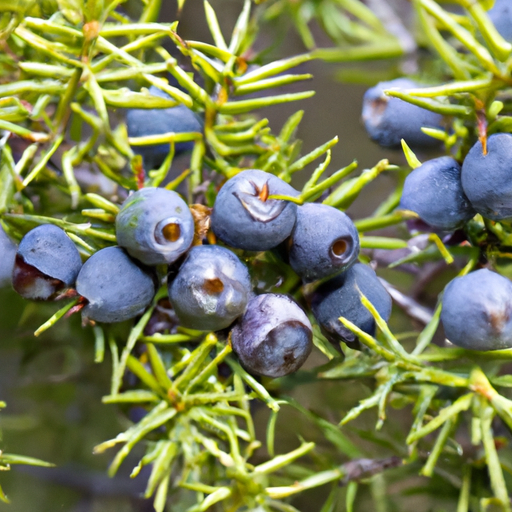The Remarkable Juniper Berry: A Flavorful Ingredient with a Rich History
If you’re someone who loves exploring unique flavors and experimenting with ingredients, then it’s time to get acquainted with the juniper berry. This tiny fruit may seem unassuming, but its distinctive taste and rich historical significance make it a fascinating addition to any culinary creation. In this blog post, we will delve into the world of juniper berries, exploring their flavor profile, culinary applications, nutritional value, and intriguing history.
Taste and Aroma
Juniper berries possess a flavor profile that is neither entirely sweet nor savory. They are celebrated for their intense, pine-like taste, which lends a refreshing and slightly resinous aroma to dishes. While the berries themselves are small and dark purple, their flavor can best be described as a harmonious combination of citrusy, earthy, and floral notes. It is this unique blend of flavors that gives juniper berries their undeniable charm.
Culinary Uses
While often associated with the production of gin, juniper berries offer a range of culinary possibilities beyond the drinks cabinet. Here are a few creative ways to incorporate this versatile ingredient into your cooking:
1. Flavorful Marinades and Rubs
Juniper berries are a popular choice for marinades and rubs, particularly for game meats like venison and wild boar. Crushed and combined with other herbs and spices, they infuse the meat with a sophisticated and slightly smoky flavor, making it truly memorable.
2. Sauces and Gravies
Incorporating juniper berries into sauces and gravies can elevate your dishes to new heights of deliciousness. After gently crushing the berries, add them to the saucepan along with other herbs and aromatics. Simmering this mixture will release the berries’ essential oils, infusing your sauce with a robust and exotic taste.
3. Pickling and Preserving
Juniper berries have long been a staple in pickling recipes. Boasting natural antimicrobial properties, they not only lend a unique flavor to pickled vegetables but also help preserve them. From pickled cucumbers to sauerkraut, juniper berries add a delightful tang and enhance the overall pickling experience.
4. Baking and Desserts
Believe it or not, juniper berries can even find their way into desserts! Ground juniper berries can be added to cookie dough, bread, or cake recipes for a surprising twist. Their aromatic flavor complements sweet dishes, adding intrigue and complexity to familiar flavors.
Nutritional Benefits
Apart from their flavor and versatility, juniper berries offer several health benefits. While they are not typically consumed in large quantities, their inclusion in your culinary repertoire can contribute to your overall well-being. Here are some nutritional highlights:
Antioxidant-Rich: Juniper berries contain potent antioxidants that help protect your body from harmful free radicals and promote a healthy immune system.
Rich in Vitamin C: These little berries pack a powerful punch of vitamin C, supporting collagen production and aiding in the maintenance of healthy skin and immune function.
Diuretic Properties: Historically, juniper berries have been used to support healthy kidney function and aid in detoxification processes due to their diuretic properties.
Historical Significance
Beyond their culinary applications and nutritional benefits, juniper berries hold significant historical and cultural value.
Traditional Medicine: Juniper berries have a long history of use in traditional medicine. They were believed to have a variety of healing properties and were used to treat ailments such as digestive issues, joint pain, and even as a natural diuretic.
Symbolic Significance: In European folklore, juniper trees and berries were often associated with protection, purification, and luck. From repelling evil spirits to being included in protective amulets and charms, juniper berries were revered for their mystical qualities.
In Conclusion
As you embark on your culinary journey, don’t miss out on the incredible flavor and versatility that juniper berries offer. With their refreshing taste, diverse culinary applications, and remarkable historical significance, these little berries are ready to elevate your cooking to new levels. So next time you encounter some juniper berries, embrace their unique flavor and explore the countless possibilities they hold. Happy cooking!
Disclaimer: It’s important to note that while juniper berries offer various health benefits, they should be consumed in moderation. If you have any underlying health conditions or concerns, consult a healthcare professional before incorporating them into your diet.
Juniper Berry
Origin: The juniper berry is the fruit of the juniper plant, which is a member of the cypress family. It is native to the northern hemisphere, with various species found throughout Europe, North America, and Asia.
Common Uses: Juniper berries have been used in cooking for centuries and are commonly used in traditional European cuisine, particularly in Scandinavian and German dishes. They have a piney and slightly sweet flavor and are often used to enhance the taste of game meats, sauerkraut, pickles, and sauces. They are also a key ingredient in gin production, providing its distinctive aroma.
Nutritional Benefits: Juniper berries are low in calories and rich in antioxidants, vitamins, and minerals. They contain vitamin C, vitamin A, and various beneficial plant compounds such as flavonoids and polyphenols. However, they are typically used in small quantities, so their nutritional impact is often limited.
Unique Properties: One unique property of juniper berries is their essential oil content, which gives them their characteristic flavor and aroma. The essential oil contains compounds that have been shown to possess antibacterial and antifungal properties. Additionally, juniper berries have long been valued for their potential diuretic properties and have been used in traditional medicine for supporting kidney and urinary health.
Historical Significance: Juniper berries have a rich historical significance and have been used for various purposes throughout history. In ancient times, they were believed to have medicinal properties and were used to treat a range of ailments. They were also used for culinary purposes and preservation, as their antimicrobial properties helped to prevent spoilage. In some cultures, juniper berries have also been associated with various symbolic meanings and used in religious or spiritual rituals.




Use the share button below if you liked it.
It makes me smile, when I see it.